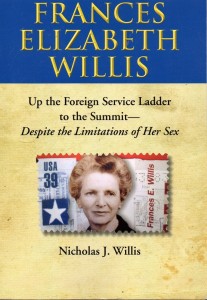Book Review: Frances Elizabeth Willis by Nicholas J. Willis
Disclaimer: I received this book as a Goodreads giveaway on the premise that I would review it.
Frances Elizabeth Willis (1899-1983) was the first woman to rise through the ranks of the U.S. Foreign Service to become a Career Ambassador, serving as the United Stares ambassador to Switzerland, Norway and Ceylon. (There had been other women who had served as ambassadors previously, but they had been political appointees.) This biography traces her remarkable career.
The author (her nephew) starts with a rare anecdote Miss Willis (and it was Miss Willis until she became Madame Ambassador) shared with her family, asking them not to repeat it until everyone involved was dead. And no wonder, as it contradicted official history and might have reflected unfavorably on another ambassador! She never kept a diary, did not retain any official documents that were not about her directly, and by the time she thought about writing a memoir, Miss Willis’ memory was beginning to fail for medical reasons.
So it is that there are some unfortunate gaps in this biography–but I have certainly seen biographies with worse gaps. The author was able to get access to declassified documents, including her service dossier, and the latter has much of the interest in this book. It seems that during her career, Frances Willis never requested to see what was in her dossier, and as a result, was unaware of just how deep the gender bias against her was.
The subtitle of the biography is “Up the Foreign Service ladder to the summit–despite the limitations of her sex, a repeated phrase in the dossier. The old saying that a woman has to be twice as good as a man to be given half the respect certainly seems true here. The “old guard” did not think consular work and diplomacy were fit work for women, and did everything they could behind the scenes to discourage them.
But Miss Willis was an extraordinary person, and went above and beyond to prove her worth to the Foreign Service. Promotions might have come long after they should have, but she kept plugging away, and those co-workers who knew her personally boosted her career.
This book offers some interesting insights into the world of the Foreign Service, and how it changed during Miss Willis’ long career. Sadly, some of the most interesting-sounding bits remain classified, so we will probably never know much about the espionage side of her job.
There are photos throughout the text, rather than crammed into the middle like many other biographies. There’s an appendix explaining the history, bureaucratic structure and nomenclature of the Foreign Service, which is helpful to decipher some of the more arcane moments, as well as an index.
The author is perhaps a little too fond of reminding the reader that he was in the Navy, and there are some spellchecker-passed typos (“compliment ” and “complement” get mixed up a couple of times.) It’s not bad for a self-published book, but could have used another editorial pass.
This book will be of interest to those who want a look at the workings of American diplomacy, and those who want to read about successful women (note that Frances Williams was careful to distance herself from the feminist movement as such; that could have been the kiss of death in the early days.)
Due to the self-publishing, it may not be stocked in your local library, so consider buying a copy.

